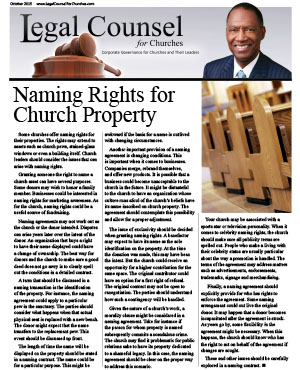Some churches offer naming rights for their properties. The rights may extend to assets such as church pews, stained-glass windows or even a building itself. Church leaders should consider the issues that can arise with naming rights.
Granting someone the right to name a church asset can have several purposes. Some donors may wish to honor a family member. Businesses could be interested in naming rights for marketing awareness. As for the church, naming rights could be a useful source of fundraising.
Naming agreements may not work out as the church or the donor intended. Disputes can arise years later over the intent of the donor. An organization that buys a right to have their name displayed could have a change of ownership. The best way for donors and the church to make sure a good deed does not go awry is to clearly spell out the conditions in a detailed contract.
A term that should be discussed in a naming transaction is the identification of the property. For instance, the naming agreement could apply to a particular pew in the sanctuary. The parties should consider what happens when that actual physical seat is replaced with a new bench. The donor might expect that the name transfers to the replacement pew. This event should be discussed up front.
The length of time the name will be displayed on the property should be stated in a naming contract. The name could be for a particular purpose. This might be awkward if the basis for a name is outlived with changing circumstances.
Another important provision of a naming agreement is changing conditions. This is important when it comes to businesses. Companies merge, rebrand themselves, and offer new products. It is possible that a business could become unacceptable to the church in the future. It might be distasteful to the church to have an organization whose culture runs afoul of the church’s beliefs have its name inscribed on church property. The agreement should contemplate this possibility and allow for a proper adjustment.
The issue of exclusivity should be decided when granting naming rights. A benefactor may expect to have its name as the sole identification on the property. At the time the donation was made, this may have been the intent. But the church could receive an opportunity for a higher contribution for the same space. The original contributor could have an option for a first right of refusal. The original contract may not be open to renegotiation. The parties should understand how such a contingency will be handled.
Given the nature of a church’s work, a morality clause might be considered in a naming agreement. Take for instance if the person for whom property is named subsequently commits a scandalous crime. The church may find it problematic for public relations sake to have its property dedicated to a shameful legacy. In this case, the naming agreement should be clear on the proper way to address this scenario.
Your church may be associated with a sports star or television personality. When it comes to celebrity naming rights, the church should make sure all publicity terms are spelled out. People who make a living with their celebrity status are usually particular about the way a promotion is handled. The terms of the agreement may address matters such as advertisements, endorsements, trademarks, signage and merchandising.
Finally, a naming agreement should explicitly provide for who has rights to enforce the agreement. Some naming arrangement could out live the original donor. It may happen that a donor becomes incapacitated after the agreement is struck. As years go by, some flexibility in the agreement might be necessary. When this happens, the church should know who has the right to act on behalf of the agreement if changes are sought.
These and other issues should be carefully explored in a naming contract.

